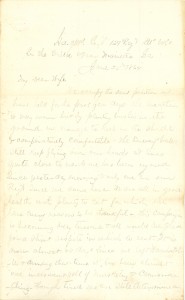 [google-map-v3 width=”400″ height=”300″ zoom=”12″ maptype=”hybrid” mapalign=”right” directionhint=”false” language=”default” poweredby=”false” maptypecontrol=”false” pancontrol=”false” zoomcontrol=”true” scalecontrol=”false” streetviewcontrol=”false” scrollwheelcontrol=”false” addmarkermashupbubble=”false” addmarkerlist=”34.023405; -84.616764{}1-default.png” bubbleautopan=”true” showbike=”false” showtraffic=”false” showpanoramio=”false”]
[google-map-v3 width=”400″ height=”300″ zoom=”12″ maptype=”hybrid” mapalign=”right” directionhint=”false” language=”default” poweredby=”false” maptypecontrol=”false” pancontrol=”false” zoomcontrol=”true” scalecontrol=”false” streetviewcontrol=”false” scrollwheelcontrol=”false” addmarkermashupbubble=”false” addmarkerlist=”34.023405; -84.616764{}1-default.png” bubbleautopan=”true” showbike=”false” showtraffic=”false” showpanoramio=”false”]
Hd. Qurs. Co. “A” 129th Regt. Ills. Vols.
In the Field Near Marietta, Ga.
June 25th 1864
My Dear Wife
We occupy the same position we have held for the past few days. The weather is very warm, but by planting bushes in the ground we manage to keep in the shade & comparatively comfortable. The Enemy’s balls still keep flying over our heads, at times quite close to us. No one has been injured since yesterday morning, & only one in our Regt. since we came here.1
We are all in good health with plenty to eat for which we have every reason to be thankful. This Campaign is becoming very tiresome, & all would be glad for a short respite in which to rest. It is now almost 60 days since we left Wauhatchie, &, during that time, it has been almost one incessant roll of musketry & cannonading. Though tired we are still determined to carry out as near as possible the original intention of the Campaign.2 We have heard heavy cannonading in the direction of Kenesaw mountains all morning.3 With what result we cannot tell.
We have no late news from Grant’s Army, except that they were rapidly crossing James River.4 Of course, none can tell the final result of all our efforts, but, trusting in God, all will be well. If I could see anything but misery in any other than a complete victory to our arms, I might doubt the intentions of Our Father. I therefore feel Satisfied that he will not sacrifice this great nation & people without the accomplishment of some great design. Victory must then be ours, & while we wish no evil to our erring enemy, yet we pray God that their eyes may be opened & that right and truth may prevail.
We have been looking for Jim Morrow for several days, but he has not yet arrived.5 Judd was back to Chattanooga & returned yesterday.6 The Rebs succeeded in destroying the R. R. Bridge near Tilton, but it was rebuilt & the trains running in 24 hours afterward.7 Green saw Sergt. Gaff this morning; he was well.
There is heavy skirmishing on our right, &, as we may have work to do here,8 I must close. I have not heard from Bros. John or Sammy for some time. Give my love to all. May the richest of Heaven’s blessings rest upon you. Trust ye in the Lord forever, for in the Lord Jehova is everlasting strength.
Your Affect. Husband
J. F. Culver
P.S. Nate [Hill] & Chris [Yetter] are well.
- On June 22d the division’s infantry was too far north of the Powder Springs road to participate in the repulse of Hood’s corps at Kolb’s Farm. During the night, Butterfield’s division was relieved by Stanley’s division of Howard’s corps and marched south, camping north of the Powder Springs road in the rear of Williams’ XX Corps division. Next morning the 2d Brigade (Coburn’s) was advanced and took position north of the road, within musket range of the foe’s breastworks, and entrenched. South of the road was a line of works occupied by the XXIII Corps. The 129th Illinois, along with other units of the 1st Brigade, was posted in support of Coburn’s soldiers. On June 24 a number of men from the 129th were sent forward to man the picket line, and one of them was killed. O. R., Ser. I, Vol. XXXVIII, pt. II, pp. 326, 367, 382, 440; Grunert, History of the 129th Illinois, p. 78. [↩]
- The mission given Sherman’s “army group” by General Grant was the destruction of the Confederate Army of Tennessee. [↩]
- Big and Little Kennesaw Mountains were four miles north of the camp of the 129th Illinois, and during the day there was a “heavy cannonade from [a] Rebel battery on the mountain.” O. R., Ser. I, Vol. XXXVIII, pt. IV, p. 594. [↩]
- Checkmated by General Lee’s Army of Northern Virginia at Cold Harbor, General Grant skillfully disengaged Meade’s Army of the Potomac. Stealing a march on Lee, the Army of the Potomac crossed the James River on a pontoon bridge. On June 15 the Army of the James, supported by one corps from the Army of the Potomac, attacked and captured a section of the fortifications guarding the eastern approaches to Petersburg. The Federals were unable to exploit this success, and the Confederates pulied back, dug in, and held. [↩]
- Sergeant Morrow had been sent to Illinois in February on recruiting duty. Regimental Papers, 129th Illinois, NA. [↩]
- Curtis J. Judd, a 24-year-old clerk, was mustered into service on Sept. 8, 1862, as a private in Company B, 129th Illinois Infantry, and was detached as the colonel’s clerk even days later. Judd was promoted regimental sergeant major on April 17, 1863. Sergeant Major Judd was mustered out near Washington, D.C., June 8, 1865. Compiled Service Records of Union Soldiers, NA. [↩]
- On the night of June 23, 300 Confederate horse-soldiers struck the Western & Atlantic Railroad near Dalton. One bridge was burned and a second heavily damaged by the raiders. O.R., Ser. I, Vol. XXXVIII, pt. IV, p. 587. [↩]
- General Schofield’s troops, south of the Powder Springs road, sought to outflank Hood’s corps by extending their right. O.R., Ser. I, Vol. XXXVIII, pt. II, p. 514. [↩]

 Subscribe via RSS
Subscribe via RSS Subscribe via Email
Subscribe via Email